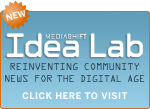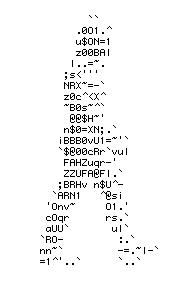Weblogs, Wikis und Martin Nisenholtz
Martin Nisenholtz, CEO der New York Times digital über die Zukunft der online-Medien in einem Interview mit "journalistm.co.uk":
What can web journalism achieve that print journalism can't?
First, the Internet is the freest distribution system ever invented. The fact that NYTimes.com is read literally everywhere on earth is a miracle. We take the First Amendment very seriously here in the US and the web is the most important first amendment tool since the invention of language. It's much more powerful than print as a distribution vehicle because it goes everywhere and it's very difficult to stop.
Second, the web is much better than print at reader input. Take a look at movies.nytimes.com and you will see our readers helping one another find the best movies through a simple rate and review function.
Third, the web carries digital data regardless of its form. We can combine text, photography, graphics, audio and video in ways that no other medium can do. The best young journalists understand that this is a genuinely new form of expression.
Fourth, we are not constrained by newsprint, either in form or in the cost structure of the business. Speaking of movies.nytimes.com, we offer 5,000 film reviews.
Fifth, you can slice and dice content in almost unlimited ways. Through our NewsTracker service, for example, I can deliver to you all of the most relevant stories that we publish on a particular topic. This doesn't negate the serendipity of our home page and section fronts; on the contrary, the service brings you things you might otherwise miss if you're a busy person.
....und weiter:
How will new media influence the future of news provision?
New media will have profound influence, despite the naysayers. While some of my colleagues disagree, I think the web log and Wiki movements will have a growing impact on the public dialogue. I believe that blogs complement more mainstream sources. It used to be that patients got information from one source - the person's doctor. Google came along and now patients can get smart without having to understand a medical text. On balance, I think this is good. The same is true in news. We are moving toward a much more distributed kind of news sourcing. This makes quality reporting and editing all the more important. In an atmosphere of information overload, editors make a great deal of sense.
Vollständiges Interview mit Martin Nisenholtz.
What can web journalism achieve that print journalism can't?
First, the Internet is the freest distribution system ever invented. The fact that NYTimes.com is read literally everywhere on earth is a miracle. We take the First Amendment very seriously here in the US and the web is the most important first amendment tool since the invention of language. It's much more powerful than print as a distribution vehicle because it goes everywhere and it's very difficult to stop.
Second, the web is much better than print at reader input. Take a look at movies.nytimes.com and you will see our readers helping one another find the best movies through a simple rate and review function.
Third, the web carries digital data regardless of its form. We can combine text, photography, graphics, audio and video in ways that no other medium can do. The best young journalists understand that this is a genuinely new form of expression.
Fourth, we are not constrained by newsprint, either in form or in the cost structure of the business. Speaking of movies.nytimes.com, we offer 5,000 film reviews.
Fifth, you can slice and dice content in almost unlimited ways. Through our NewsTracker service, for example, I can deliver to you all of the most relevant stories that we publish on a particular topic. This doesn't negate the serendipity of our home page and section fronts; on the contrary, the service brings you things you might otherwise miss if you're a busy person.
....und weiter:
How will new media influence the future of news provision?
New media will have profound influence, despite the naysayers. While some of my colleagues disagree, I think the web log and Wiki movements will have a growing impact on the public dialogue. I believe that blogs complement more mainstream sources. It used to be that patients got information from one source - the person's doctor. Google came along and now patients can get smart without having to understand a medical text. On balance, I think this is good. The same is true in news. We are moving toward a much more distributed kind of news sourcing. This makes quality reporting and editing all the more important. In an atmosphere of information overload, editors make a great deal of sense.
Vollständiges Interview mit Martin Nisenholtz.
Cyberwriter - 9. Jul, 10:45 - online Journalism
0 Kommentare - Kommentar verfassen - 0 Trackbacks





















Trackback URL:
https://cyberwriter.twoday.net/STORIES/43438/modTrackback